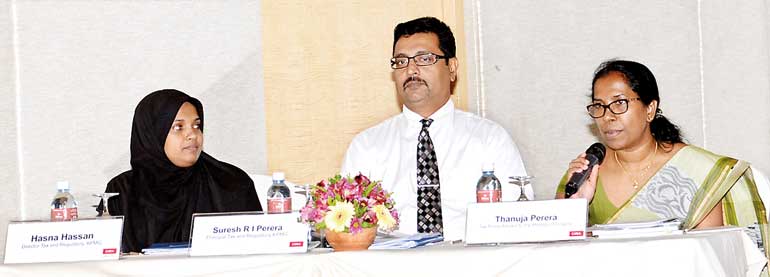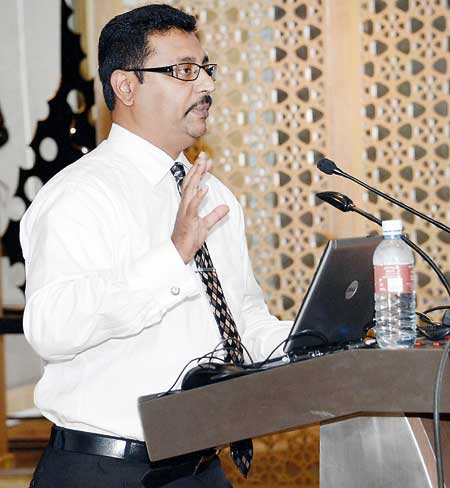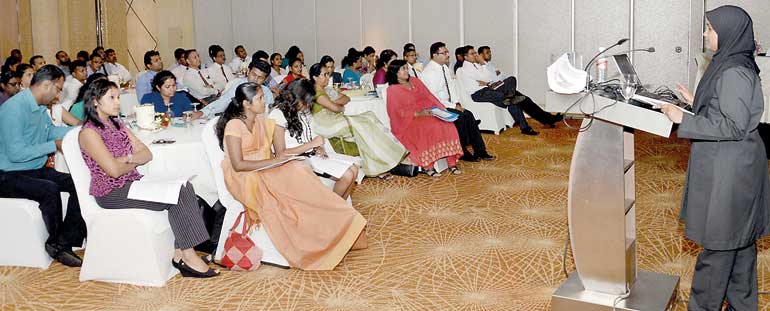Sunday Feb 22, 2026
Sunday Feb 22, 2026
Tuesday, 9 June 2015 00:01 - - {{hitsCtrl.values.hits}}
CIMA conducted a seminar to shed light on the content of the recent bills subject to committee stage amendments and pending legislation on 27 May at the JAIC Hilton. Presentations were made by Suresh R.I. Perera and Hasna Hassan of KPMG.
Thanuja Perera, Tax Policy Advisor to the Ministry of Finance and Planning joined in the panel discussion to provide clarity for queries raised by the participants.

Concessions for investments
Suresh R.I. Perera in his presentation pointed out that tax holidays stemming from Section 16 C, 16 D and 17A of the Inland Revenue Act have come to an end for new investments. There are extension for certain investments which have already commenced where the deadline would be extended till 1/4/2017 as per the Inland Revenue Bill.
Moreover, there are certain half tax holiday for selected areas in the Inland Revenue Bill, but since these have not been legislated until the bills are passed the investors may face inconvenience during the interim period with regard to the certainty of the concession.
A few of the concessions includes concessions for expansion of manufacturing business to outside the Western Province, new undertaking engaged in manufacture of product for export, local businesses established in the 1970s, undertaking in lagging regions, investment in manufacturing business, local entrepreneurs engaged in intercropping/vegetable food processing activities.
Tax deductions
Perera also mentioned that while the scope of 300% tax deduction has been further widened, it has also been extended to certain skilled development training where the expenditure is incurred by any person registered with the Tertiary and Vocational Education Commission, research for high value agricultural products and brand promotion for international brands.
However, he opined more clarity should be shed with regard to the exact nature of the brand promotion whether it could entail costs incurred both local and outside Sri Lanka. The royalty payment under Section 25 where the royalty payable for the relevant Year of Assessment and paid during the same year of assessment is allowed.
The bills also contain provisions for the facilitation of the segregation of the insurance industry as well as the financial consolidation of the banks.
Electronic returns
Perera also pointed out that the provisions in the tax bills to amend tax statutes pending legislation include provisions to file tax returns electronically as well for the Inland Revenue Department to raise tax assessments and additional assessments electronically and appeals to be filed electronically. The tax office could also call for information electronically.
 The Minister has been empowered to issue regulations on the recommendation of the Commissioner General under the Electronic Transaction Act with regard to electronic communication and keeping records electronically. These provisions have been included to facilitate Sri Lanka to embark on implementation of the Revenue Administration Management Information System (RAMIS) in the near future.
The Minister has been empowered to issue regulations on the recommendation of the Commissioner General under the Electronic Transaction Act with regard to electronic communication and keeping records electronically. These provisions have been included to facilitate Sri Lanka to embark on implementation of the Revenue Administration Management Information System (RAMIS) in the near future.
Finance Bill
The Finance Bill contains 10 new levies that were proposed in the January 2015 Budget proposals. Whilst Mansion tax and motor vehicle importers levy are recurring levies the other seven levies are one off taxes. i.e. Super Gain Tax, Bars & Tavern Levy, Migrating Tax, Casino Levy, Mobile Telephone Operators Levy, Direct to Home Satellite Services Levy, Dedicated Sports Channel Levy, Satellite Location Levy
Super Gain Tax (SGT)
Though as per the bill the SGT is to be paid in three instalments on 15 March, 15 July and 15 September, the bill does not stipulate that all three instalments should be paid in equal instalments. Hence though Finance Bill may not be enacted due to practical considerations before the dates stipulated in the bill for payment of first two instalments, the full payment may be collected on the due date of the last instalment due on 15 September.
Possibility also exist for rescheduling of payment dates at the committee stage amendments if the bill is to go through either in this Parliament or the next Parliament after the general elections. During the panel discussion, Thanuja Perera clarifying a point raised by Suresh R.I. Perera in his presentation stated that in case of companies (mostly banks and financial institutions) where the accounting period runs from 1 January to 31 December, 12-month period for testing Rs. 2 b threshold would be the period from 1 January 2013 to 31 December 2013 notwithstanding the wording in the bill referring to the period as year of assessment commencing from 1 April 2013.
SGT bill has incorporated certain definitions by reference to certain provisions of the Inland Revenue Act and Year of Assessment is defined as the 12-month period from 1 April to 31 March in the subsequent year.
It was also pointed out with regard to SGT default and recovery the provisions in the Inland Revenue Act will be applicable including the normal four stage appellate procedure commencing with right of appeal to the Commissioner General.
Whilst SGT would not be applicable to BOI companies that enjoyed a tax holiday during Year of Assessment 2013/14, a BOI company that paid income tax as per the formula (a percentage of the Turnover is deemed the profit) set out in the BOI Agreement itself would attract SGT at 25% on profit before income tax (PBIT) as per audited financial statements as the tax base.
All other companies including BOI companies that have come out of the tax holidays and paying income tax as per the provisions of the Inland Revenue Act irrespective of whether at the standard income tax rate or a concessionary rate would be exposed to SGT at the rate of 25% on the Taxable Income if such company has recorded PBIT exceeding Rs. 2 b in the year of assessment commencing from 1 April 2013 as per Audited Financial Statements.
In the case of a group of companies each company in the group would be liable for SGT at 25% on Taxable Income if the subsidiaries and holding company recorded an aggregate PBIT exceeding Rs. 2 b of excluding associate companies.

Default and recovery procedure
However with regard to the other levies included in the finance bill while the normal four stage appellate procedure is not available the defaulters would be prosecuted in the Magistrate Court. The process entails the collecting authority of the relevant levy to issue a certificate to the Magistrate stipulating the quantum of the levy in default with the name and address of the defaulter.
The Magistrate by Order shall recover the default tax if no satisfactory show cause is adduced by the defaulter as to why no recovery proceedings should continue against him. This recovery process would be applicable to all taxes under the Finance Bill other than SGT and Migration Tax.
Motor Vehicle Importers Levy
Motor Vehicle Importers Levy of Rs. 1.5 m per annum would not be applicable to importers who import vehicles for personal use but such an importer would be precluded from selling the vehicle for a period of four years from the date of registration.
Migration Tax
Providing a clarification to query raised by a participant from the audience Thanuja Perera opined that 20% migration tax would cover funds taken out of the NRFC accounts as well as per the wording in the bill as it stands now. She also stated that 20% tax would be applicable to funds remitted by migrants who have migrated prior to 1 April 2015 but where the funds are being remitted after 1 April 2015.
Suresh R.I. Perera pointed out that it was not the intention of the budget proposal to extend the tax to that scenario where the person concerned had already migrated, as the budget proposal was formulated with the intention of discouraging existing people from migrating.
Telecommunication Levy Bill
Suresh R.I. Perera tracing the history of the Telecommunication Levy pointed out that in 2011 the levy was introduced as a composite levy at 20% in lieu of VAT and NBT to be borne by the recipient both on internet services as well as services other than internet services. The rate of Telecommunication Levy applicable on internet services was reduced to 10% with effect from January 2013 and irrespective of post-paid or prepaid the levy would continue to be borne by the recipient of the internet services into the future.
The rate applicable on services other than internet services was increased to 25% in January 2014 but to be borne by the recipient. The bill pending legislation has split the party as to who should bear the levy pertaining to services other than internet services. According to the bill pending legislation from April 2015 levy applicable to prepaid services should be borne by the telecom operator whereas post-paid component continues to be borne by the recipient of the service.
Collections by Telecom Regulatory Commission
As per the bill mobile telephone operators levy of Rs. 250,000, and Direct to Home Satellite Services Levy of Rs. 1 b, Satellite Location Levy of Rs. 1 b and Dedicated Sports Channel Levy of Rs. 1 b are due to be paid to the Telecommunication Regulatory Commission on or before 31 May but due to finance bill not been legislated to date these levies may not be collectible by the date stipulated in the bill.
Casino Levy and Bars & Tavern Levy
Suresh R.I. Perera raised the point whether Casino Levy and Bars & Taverns Levy is meant to apply only to those who held those licenses only as at 31 March 2015 only and would not be applicable to Casino Licenses and Bars & Taverns Licenses issued in the future. The respective charging sections of the two levies refer to only those holders of such licenses as at 31 March 2015.
Individual Income Tax
Hasna Hassan, Director – Tax & Regulatory, in her presentation covered the income tax implications on individual, Value Added Tax (VAT) and Nation Building Tax (NBT). As per the Inland Revenue Bill, the maximum income tax rate for employees is 16%. Hassan explained that in the past the maximum income tax rate was only extended to “Professionals” as defined in the Inland Revenue Act. She mentioned that it was a welcome amendment for all employees.
Hassan mentioned that in addition to the tax free allowance of Rs. 500,000, that a qualifying payment relief that is available for all employees has been increased to Rs. 250,000 from Rs. 100,000. The qualifying payment relief is available only on employment income.
A provision has been introduced in the Bill to exempt the benefit from the provision of an interest free or subsidised loan by the employer, however with a limitation that the loan should not be provided out of funds borrowed for that purpose. Hassan explained that there is uncertainty on whether this provisions is intended to cover only certain employees, which may not be fair to all. In order to make avail of this benefit, an employee would have to ensure that the employer does not borrow and extend loans to the employee.
Hassan explained in detail the most talked about interest income concessions granted to senior citizens. As per the bill, any individual who will reach the age of 60 years during the period of 1 January 2015 to 31 March 2015 or who is more than 59 years old on the first day of the Year of Assessment commencing on or after 1 April 2015 will be entitled to interest income exemption from any deposit maintained in any bank or financial institution. Previously, only deposits in State banks were considered for concessions as per the Inland Revenue Act, however as per the Bill any deposit at any licensed commercial bank (state or otherwise) is considered for exemption.
One or more accounts of the individual or Charitable Institution with interest less than Rs. 5,000 is exempt from income tax. Earlier this exemption was limited to only one account of less than Rs. 5,000.
A 50% tax holiday has been introduced for producers of international award winning cinema or drama productions. As for this provision a five-year 50% tax holiday is granted on the profit and income from film/drama production post 1/4/2015.
The withholding tax on interest income on individuals, partnership and charitable institutions will be 2.5% as per the Income Tax Bill. Previously, a slab system was followed, however now such chargeability tiers have been removed and a flat 2.5% would be charged. The withholding tax rate of 8% for bodies of persons and 10% for companies remains unchanged.
VAT and NBT
In VAT, she explained the evolution of the VAT rates from 2002. The current VAT rate from 1/1/2015 is 11% although this has still not been passed in to Law, the same has been followed under an administrative circular. The chargeability threshold for VAT and NBT has been increased up to Rs. 15 m per annum (from Rs. 12 m) or Rs. 3.75 per quarter (from Rs. 3 m). The threshold was increased as a concessions for small entrepreneurs.
The threshold for VAT on wholesale and retail has been further reduced to Rs. 100 m per quarter in order to widen the tax base. Hassan explained that in 2013, when for the first time wholesale and retail was brought under the VAT chargeability scope, the threshold was Rs. 500 m per quarter which was later reduced to Rs. 250 m per quarter in 2014. An exemption has been introduced for the deemed VAT liability on wholesale and retail sale of locally-produced fresh milk.
She also explained that pursuant to an administrative circular issue in 2014, in the VAT Bill the definition of supply of Financial Services is extended to include leasing facilities under any finance or operating lease agreement on any asset other than any land or building.
Under the NBT Bill, the definition of ‘services’ is expanded to include “Business of Real estate and improvements thereon”.
Clarification on certain amendments
Thanuja Perera providing an update on the current status of bills, mentioned that the seven bills are still to be passed in to Law, however that taxes such as Income Tax, Value Added Tax, Nation Building Tax are being followed based on administrative circulars. Thanuja Perera also explained few amendments are being introduced to the Bills. The Migration Tax collection will be done by the Commissioner General of Inland Revenue and not the Controller of Exchange.
Further, under Super Gains Tax, there is an exclusion for foreign companies. She also responded to the questions from the audience with regard to the change of the taxable income due to an income tax assessment and the consequences thereon with regard to the Super Gains Tax. In answering a query she also clarified that in calculating the chargeability for Super Gain Tax, in the event a group company doesn’t have consolidated accounts, the individual accounts of such companies should be aggregated.
Providing clarity with regard to questions from audience with regard to the subsidised loans, she pointed out that at present administratively PAYE tax is not collected from the benefit from subsidised loans, though strictly as per the law the same is liable to PAYE taxes. She also pointed out that if the loan has been extended from employer to employee by borrowing funds for that purpose the PAYE exemption referred to under the bill will not be granted. The issue also arose whether subsidised loans to banks can attract this exemption as those in the industry as more often than not the source of funds, will be deposits from customers.